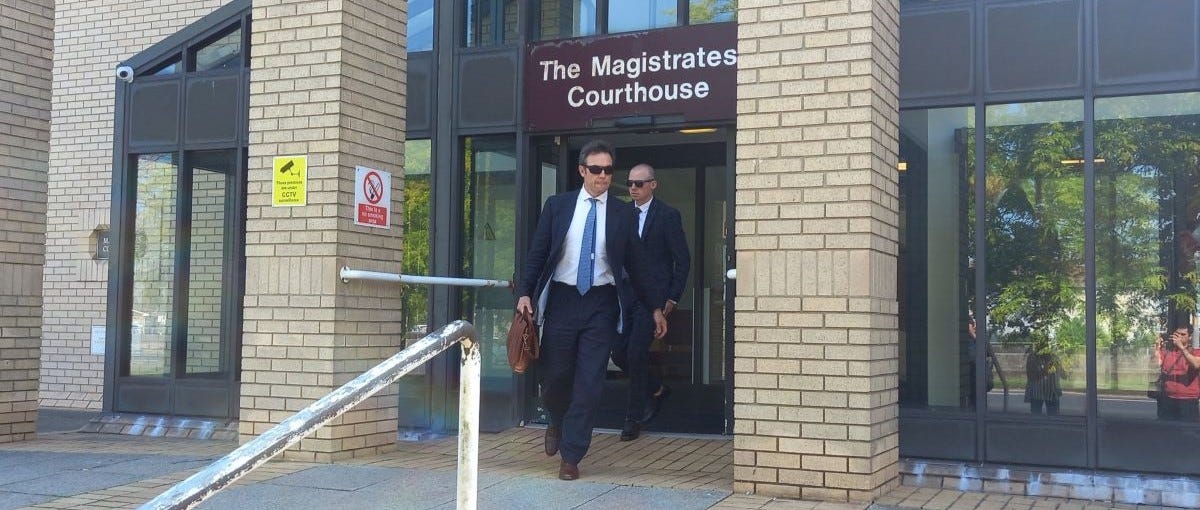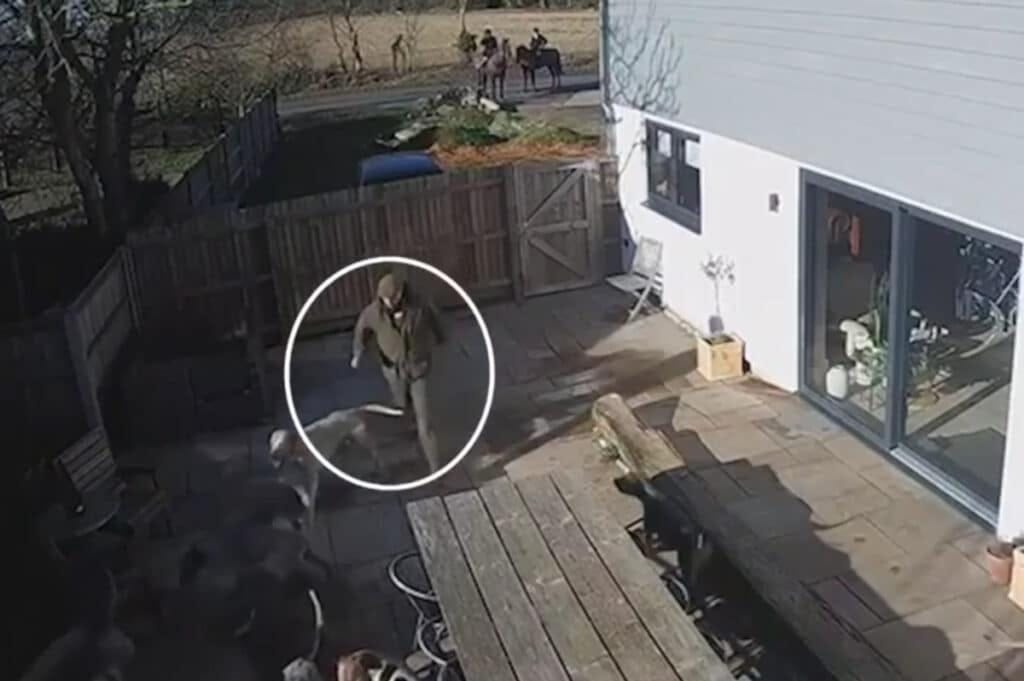GUILTY: Four convictions of illegal hunting against West Norfolk Foxhounds
Huntsman Edward “Mikey” Bell and whipper-in Andrew Egginton guilty
A district judge found two men from the West Norfolk Foxhounds guilty on two counts each of illegal hunting today (19 July). They relate to two incidents in February 2023, one of which made national news after CCTV footage was published showing hounds killing a fox in a residential garden.
District judge Matthew Bone convicted huntsman Edward “Mikey” Bell and whipper-in Andrew Egginton on two counts each of offences under Section 1 of the Hunting Act. The first incident took place near Tittleshall on 8 February 2023 while the second incident occurred on 20 February 2023 near Hingham, both in Norfolk. Also on trial were Robert Gurney and Andrew Kendall, both masters of the West Norfolk Foxhounds.
Evidence against the hunt on 8 February was captured by Norfolk/Suffolk Hunt Saboteurs. It included video footage of hounds chasing a fox as well as the behaviour of the hunt including the four men charged. Supporting evidence was provided by police including a post-incident drone fly-by of the scene used to map out the route of the hounds and hunt.
The evidence
Using the evidence provided, prosecuting lawyer Mark Jackson pushed for Gurney’s involvement in the 8 February fox chase. Specifically, Gurney was seen on camera in the vicinity of hounds as they chased a fox but taking no action. Gurney’s defence was that he was adjusting his bridle at the time and didn’t see the fox or hounds, a claim that the prosecution described as “quite extraordinary”.
However, the judge was unable to find Gurney guilty because defence lawyer Stephen Welford emphasised hunt masters’ inability to control hounds. Instead that was the responsibility of hunt staff, which in this case was Bell and Egginton. The judge found them guilty of unlawful hunting as a result of their inaction as the pack chased the fox. District judge Bone cited sab footage of hounds running in one direction, with Bell then taking a phone call and immediately turning the hounds around to run towards the fox as “particularly clear” evidence of guilt.
This showed intent, a crucial feature of successful prosecutions in hunting cases. In his summary Welford raised DPP v Anthony Wright 2009, case law which set a precedent that a successful prosecution must show intent on behalf of the huntsman to chase a mammal. This has been a crucial tool in defences by hunts since it was set, with it playing a key role in exonerating three members of the Dunston Harriers at Great Yarmouth Magistrates in March 2023.
It was also the defence that Welford relied on for the hunt’s defence against the 20 February case. This was the incident where CCTV footage captured hounds chasing and killing a fox in the garden of a private residence in Hingham. Specifically, the defence claimed that the hounds were following an artificially-laid trail when they accidentally got onto a fox. However, the hunt was far enough away at that point that they were unable to intervene.
'Unknown man' enters garden to retrieve killed fox. ITV News
District Judge Bone commented that the evidence of intention to hunt in this case was less clear. However, the actions of an ‘unknown man’ who climbed into the garden and retrieved the fox’s dead body showed the hunt was concerned about what had just happened. Welford tried to describe this man as a “red herring” and when Bone said it highlighted the hunt’s concern, Welford replied that there could have been many reasons for retrieving the body. However, Bone pointed out that “there are no good ones” and said he didn’t accept that Bell and Egginton couldn’t name the man.
Due to this action as well as Egginton contradicting himself, having first refused to co-operate with the police during initial interviews then later stating in court he wasn’t able to give the man’s name, Bone said:
I found the huntsman and whipper-in took the opportunity presented to unlawfully hunt a fox.
The police had charged Bell, Egginton, Gurney and Kendall with a total of 25 offences. By the time it reached court, the four men faced 18 charges including Hunting Act and Dangerous Dogs Act offences as well as criminal damage. Only the four Hunting Act offences against Bell and Egginton were ultimately proven, with the others disproven or had a lack of evidence.
As a result, both men faced a £1700 penalty. The judge ordered them to pay £500 each per offence, a victim surcharge of £400 each, and prosecution costs of £300 each. Bone said to Gurney and Kendall that they “leave the court as men of good character, you have been acquitted.”
Dangerous Dogs Act
One interesting aspect of the trial was a discussion around the Dangerous Dogs Act charges. These were levied specifically against the 20 February incident. Jackson, prosecuting, said that “it’s clear those dogs were out of control,” citing how far away the hunt was from the pack and the lack of urgency shown by Bell, Egginton and others to take control.
In defence, Welford said that “there is always a risk when hounds are taken out into the countryside”, but that Bell and Egginton had tried everything in their power to prevent the hounds killing. Instead, it was circumstances such as an inability to follow the direct path of the hounds, that prevented them from getting the pack back under control.
The judge found all Dangerous Dogs Act charges unproven, though. While he explained that there is no need for evidence of injury for prosecution under the act, he said that there was no evidence that Bell and Egginton’s actions amount to a criminal standard of the hounds being “dangerously” out of control. Furthermore, foxes aren’t protected by the Wildlife and Countryside Act 1981. Therefore the pursuit of a fox by hounds doesn’t itself amount to evidence of the hunt allowing the pack to be ‘dangerously out of control’.
Bone summarised that, as a result of the hounds getting far ahead of Bell and Egginton, they didn’t know what the pack was doing. This meant he couldn’t find them guilty of the Dangerous Dogs Act charges.
The remaining charges faced by the West Norfolk Foxhounds related to criminal damage during the 20 February incident in Hingham. One of these was the injury of a horse, the owner of whom gave evidence on 18 July 2024, the second day of the trial. However, Protect the Wild was unable to ascertain why this charge wasn’t proven.
The risk of trail hunting
When giving his verdict, district judge Bone said of the 20 February 2023 incident in Hingham that “what the dogs did was utterly distasteful”. He went on to say that:
The reality is that you didn’t just hunt once but you hunted twice and on the second occasion an animal that parliament legislated should not be hunted has been killed. That has been the law for almost 20 years yet, on my verdict, although you may have been following trails, when a fox came across the hunt you acted unlawfully.
He then handed out the fine to both Bell and Egginton, who were ordered to pay it within 28 days.
Ultimately, it was evidence captured by Norfolk/Suffolk Hunt Saboteurs and members of the public that resulted in the convictions.
While the West Norfolk Foxhounds were reported by local sab groups to have legitimately trail hunted during the 2023/24 season, there is a spectre that haunts trail hunting: Bell admitted in his evidence that it is in the instinct of foxhounds to hunt foxes, while Welford admitted that there is “always a risk” of hounds out in the countryside. That puts ‘trail hunting’ in a very difficult position and with an uphill struggle to prove it can prevent the harm and death of wildlife.
Find out more about the Norfolk/Suffolk Hunt Sabs on their Facebook page






A pack of dogs out of control?
Where are the armed response units of local police?
Anyone else with a dog dangerously out of control would be in a lot of trouble, and at least two of these cretins had plenty of 'history'.
We need a law that cuts out the complexities leading to excuses and lack of intent etc,etc,. One law to cover it all, one law and one big guilty charge! Shame prisons are so full!